
When it comes to cinema, some shoes are notoriously difficult to fill, even for the most talented performers. Vivien Leigh, one of the greatest actresses of the 1940s, found herself in such a predicament when taking on the iconic role that had previously been immortalised by the legendary Greta Garbo in not one, but two iconic films. That role was the heroine of Anna Karenina, 1948 British film directed by Julien Duvivier.
The film, like Garbo's 1927 silent and 1935 sound versions, is based on Leo Tolstoy's famous novel. Set in 1870s Czarist Russia, the story unfolds as Anna Karenina (played by Leigh), wife to the emotionally distant Count Alexei Karenin (played by Ralph Richardson), arrives in Moscow to visit her brother Stephan "Stiva" Oblonsky (played by Hugh Dempster). With her arrival, she brings a charm and diplomatic abilities that helps to Stiva, who had been unfaithful, to mend the fractured relationship with his wife Dolly (played by Mary Kerridge). However, while saving one marriage, she inadvertently sets the chain of events that would destroy her own. During the trip she meets dashing cavalry officer Count Vronsky (played by Keiron Moore) and that encounter evolves from infatuation into torrid adulterous affair that would result in public scandal and lead to tragedy.
Produced by Alexander Korda, British film mogul who was giving Hollywood a run for its money, the film was an ambitious undertaking, featuring talents from neighbouring France, including renowned dramatist Jean Anouilh, famed cinematographer Henri Alekan, and prolific director Julien Duvivier. The technical aspects of the film are well-done, with art direction by Andre Andrejew and impressive costumes by Cecil Beaton successfully reconstructing 1870s Russia at Shepperton studios. However, Korda's decision to make the film in black-and-white instead of using Technicolor, which was available at the time, resulted in a less spectacular and less grand appearance.
The script, doctored by Guy Morgan after Anouilh’s original, set in contemporary France, has been rejected by Korda, is more faithful to Tolstoy's novel than previous Hollywood versions, but this also makes it longer, with an over two-hour running time. Unfortunately, the film focuses almost entirely on the main melodramatic plot, discarding Tolstoy's social commentary, which makes the ending feel rushed.
Vivien Leigh, who was recovering from a long bout with tuberculosis, bravely tackles the role of Anna Karenina and invests all of her talent and energy, resulting in a character who displays a huge variety of strong emotions sometimes even in a single shot. Her portrayal of Anna Karenina is incredibly strong, making the character seem more alive and convincing than Garbo's version.
However, the film is compromised by the tragic miscasting of Irish actor Kieron Moore in the role of Vronsky. To say that Moore lacks chemistry with Leigh would be an understatement, and even Moore himself later admitted that he wasn't pleased with his performance. He is easily overshadowed by veteran actor Ralph Richardson in the role of Count Karenin, which is surprisingly sympathetic compared to most other versions.
Julien Duvivier directs the film well, occasionally allowing for strange experiments, like Anna Karenina's nightmarish visions and some mild eroticism that was a challenge to censorship standards of the time. The scene in which Kitty Shcherbatska, played by Sally Ann Howes, gets examined by a doctor following a mental breakdown over unrequited love for Vronsky is a notable example. Those details, however, fail to improve generally disappointing impression of the film in its entirety.
Anna Karenina was primarily made for the US market and suffered at the box office due to trade disputes between British government and Hollywood studios, which had organized retaliatory boycotts and picketing of theatres, allegedly over the British oppression of Zionist settlers in Mandatory Palestine.
While watchable and more than recommendable to Vivien Leigh's fans, this version of Anna Karenina represents a disappointment. Despite its strong points, it falls short of the iconic status achieved by Garbo's versions, and its flaws ultimately undermine the impact of this classic tale of love, duty, and societal expectations.
RATING: 5/10 (++)
Blog in Croatian https://draxblog.com
Blog in English https://draxreview.wordpress.com/
InLeo blog https://inleo.io/@drax.leo
Hiveonboard: https://hiveonboard.com?ref=drax
Rising Star game: https://www.risingstargame.com?referrer=drax
1Inch: https://1inch.exchange/#/r/0x83823d8CCB74F828148258BB4457642124b1328e
BTC donations: 1EWxiMiP6iiG9rger3NuUSd6HByaxQWafG
ETH donations: 0xB305F144323b99e6f8b1d66f5D7DE78B498C32A7
BCH donations: qpvxw0jax79lhmvlgcldkzpqanf03r9cjv8y6gtmk9
Posted Using InLeo Alpha